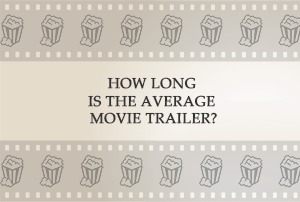 I’ll admit it – I’m not a fan of movie trailers. It feels like their two purposes are to spoil the best bits of a movie and to frustrate the audience by pointing out how long we have to wait before we can see the whole movie. Imagine if the free samples in a supermarket were followed by a two-month gap before the product was available for purchase.
I’ll admit it – I’m not a fan of movie trailers. It feels like their two purposes are to spoil the best bits of a movie and to frustrate the audience by pointing out how long we have to wait before we can see the whole movie. Imagine if the free samples in a supermarket were followed by a two-month gap before the product was available for purchase.
Nonetheless, they’re here to stay. And despite their significance in the film industry, they’re a topic I am yet to cover on this blog.
To cover up this glaring omission, I have conducted two research projects – the first is below, looking at the length of trailers, and next week I will address how far in advance trailers are released.
To study the length of trailers, I built a dataset of movie trailers for just over 20,000 movies released between 2000 and 2016, inclusive. I then found their trailers and looked at their running times (see the notes at the end of the article for details on sources and methods).
How long are movie trailers?
The length of movie trailers varies significantly. Some are extremely short, such as the 11-second long teaser trailer for Dawn of The Planet of the Apes, while others were much longer, such as the eight-and-a-half-minute-long trailer for the remake of The Girl With the Dragon Tattoo (that’s 504 seconds, to be precise).
Across the trailers I gathered data on, the average length was 114.2 seconds (i.e. one minute and 54 seconds). To give you a sense of how long that is, click here to watch an 114-second long trailer for the 2008 Tom Cruise film Valkyrie. Just under a third of movie trailers are between two and two and half minutes long.
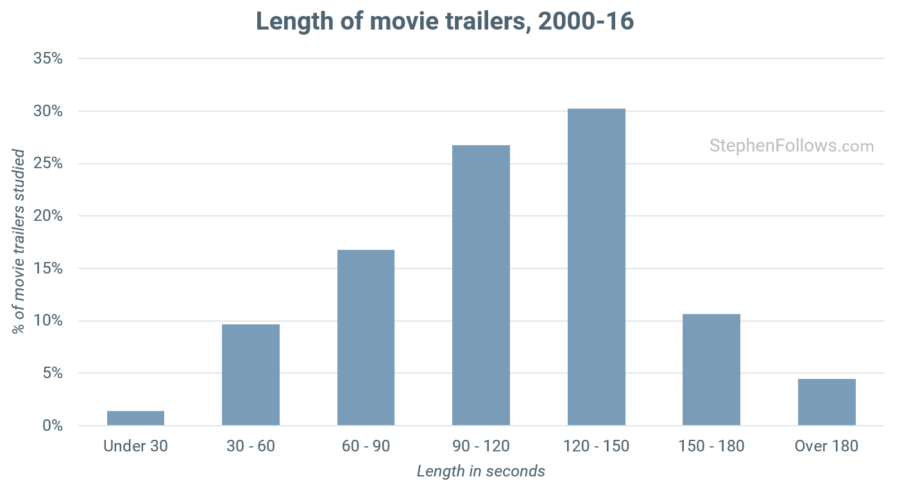
Which genres have the longest movie trailers?
The longest trailers belong to documentaries and fiction films centred on sporting and historical events, while the shortest trailers are typically for horror and sci-fi films.
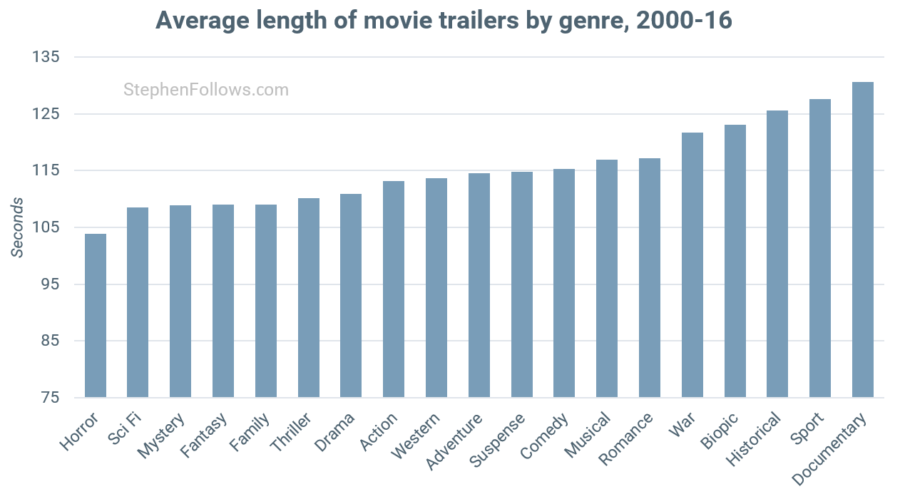
The data doesn’t tell us why this is, but my guess would be that it’s related to the amount of information that needs to be conveyed. Most horror films have a clear concept and rely on a lack of information for their power. Conversely, documentaries and films on historical events require the audience to know more about the film’s setting in order understand what’s on offer. Feel free to propose alternate explanations in the comments below.
Notes on movie trailer research
I built my dataset of movie trailer data from a number of public sources, principally YouTube, Trailer Addict, Movie List, IMDb and Wikipedia. Due to the nature of movie trailers, there a number of compromises I had to make along the way, including:
- I have far more data for recent trailers. When a film is released in 2017, all of its trailers are loudly and proudly splashed all over the internet. This makes it much easier to gather data than, say, for a movie released in 2000. Consequently, my dataset had much more data on modern movies than older ones. I have no reason to think this would affect the average lengths for each year but sadly no way to test that theory either.
- Movies often have numerous trailers. I focused the dataset on trailers intended for theatrical release but if it wasn’t clear (i.e. it was just labelled “Trailer”) then I included it.
- The running time is that of the online video, meaning that it includes film company logos which are shown ahead of the trailer in the cinema. Depending on your taste, you may or may not consider these part of the actual movie trailer.
Epilogue
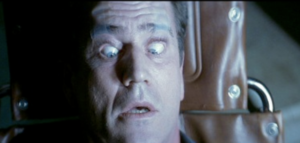 I didn’t always hate trailers. As a kid, I was an avid reader of early press coverage of movies and loved nothing more than seeing trailers for forthcoming movies. As I get older I eschew all such information about new movies, partly because the child in me wants to experience the events / spectacles / jokes for the first time during the movie, but also because the adult in me is cynical due to years of lying trailers!
I didn’t always hate trailers. As a kid, I was an avid reader of early press coverage of movies and loved nothing more than seeing trailers for forthcoming movies. As I get older I eschew all such information about new movies, partly because the child in me wants to experience the events / spectacles / jokes for the first time during the movie, but also because the adult in me is cynical due to years of lying trailers!
For example, the trailer for the 1997 film Conspiracy Theory implies that the film is about a crazy man (convincingly portrayed by Mel Gibson) who accidentally uncovers a true conspiracy. The plot of the actual movie differs from this significantly and the trailer actually proposes a better movie than is delivered.
Or trailers can include more subtle lies. A prime example of this was actually in the news last week when the new Spider-Man trailer was revealed to include shots not in the actual film.
The awesome site TVtropes.org lists eleven common lies told by trailers, including:
- Sir Not-Appearing-in-This-Trailer: Where a major actor doesn’t show up in the movie trailer.
- Lady Not-Appearing-in-This-Game: The opposite of the above, a character featuring prominently in the promotional materials doesn’t really play a significant role.
- Advertised Extra: The guy seems to be a major character, but isn’t.
- Billing Displacement: The big-name actor plays a smaller part than they were ‘supposed’ to get.
- Missing Trailer Scene: Where the trailer includes a scene that’s been cut from the film.
- Tonight, Someone Kisses: Taking a kiss out of context.
- Covers Always Lie
- Contemptible Cover: The illustration on the front of the book is oversexualized, more violent than you’d think, or just downright wrong.
- Red Skies Crossover: A big Crossover event was advertised, but the effect it has on the story is woefully minimal.
- Super Dickery: For some reason, the hero is acting like an asshole. Buy the book to find out why! Turns out that the character isn’t really acting like a dick at all.
- Wolverine Publicity: A hugely popular character is advertised on the cover as a baited hook for readers… but their involvement in the story ranges from paper-thin to absolutely none.
- Real Trailer, Fake Movie: Someone – most likely fans – has created a very convincing trailer for a movie which is unlikely to ever be released.
- Trailers Always Spoil: Surprising, but these two often overlap heavily. It’s not uncommon for a movie trailer to give away a plot twist that occurs late in a film while giving the impression that said plot-twist occurs much earlier and drives the primary conflict.
- Trailer Spoof: The movie trailer pretends to be for a different movie.
- Daydream Surprise: The greatest way for a trailer to exploit the lack of context. That scene we saw in the movie trailer is actually just someone’s imagination and does not count.
Some film editors have turned lying trailers into an artform, by re-cutting a trailer to misrepresent a film’s true genre. My favorite example is below, which pitches Kubrick’s genre-defining horror The Shining as a family-friendly romantic comedy.

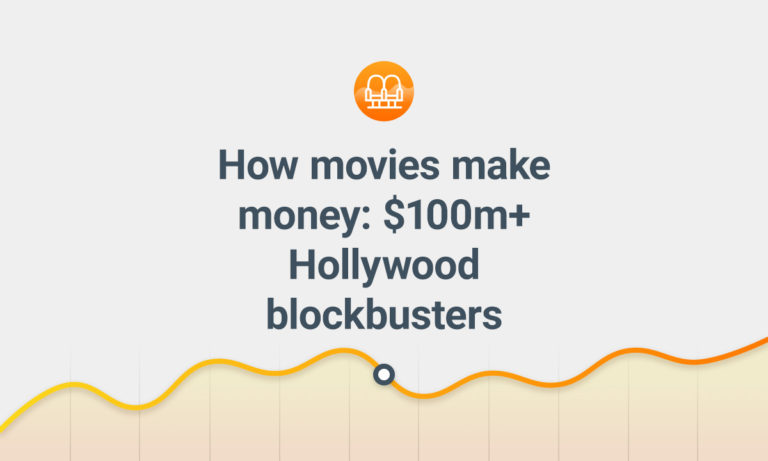
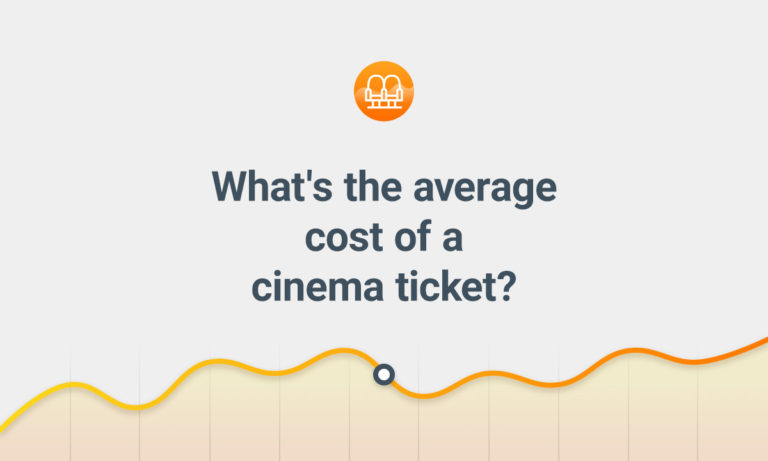
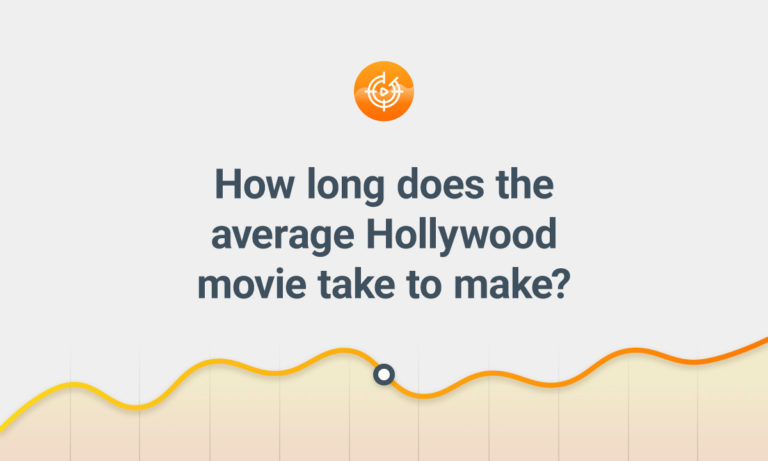

Comments
Trailers can be an art form in themselves. Here are three examples:
“A bout de souffle” (Breathless). http://www.youtube.com/watch?v=ib1OMh5fTkQ
This brilliantly abstract trailer is better than the film itself!
“Rope”. http://www.youtube.com/watch?v=8xkQoH8QbVs
This “trailer” is actually a prequel to the film. We meet a character who we never see in the film itself.
“The Big Sleep”. http://www.youtube.com/watch?v=n-K49CUaeto
The fourth wall is broken in the trailer, which is also a sort of prequel.
These are all old films. Are there any modern films with artistic trailers like these?
Hello. I am thinking of using this data for a statistics write up. is there any way i can get access to the full list of data you collected so i can reference it. thanks a bunch. George
Thanks for the information.
You note that you have more data for recent trailers. Do you have enough older trailers to assess if/how the duration of movie trailers has changed with time?
Thanks for giving me more perspective. let me do my job.